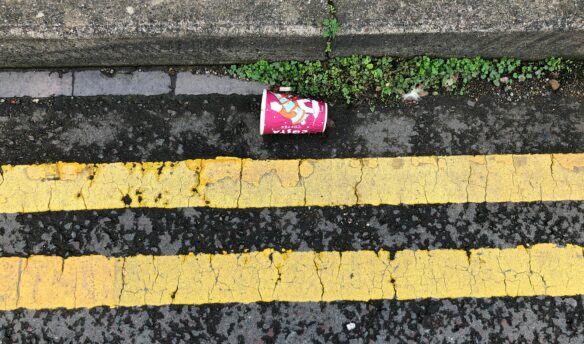Have we stepped into a time machine? Gen Z consumers are embracing creamer and instant coffee. Plus, thousands of coffee bags get recalled for being mistakenly labeled as decaf (surprise!), and you might be better off making a pour over at home in the morning rather than drinking coffee at the office.
‘Coffee Drinkers Urged to Check Cabinets After Product Recall’ – via The Independent
Massimo Zanetti Beverage has voluntarily recalled more than 4,000 bags of its Traverse City Cherry Artificially Flavored Decaf Light Roast Ground Coffee, distributed across 15 states. Why? The bags were mislabeled as decaf—but the beans were actually fully caffeinated.
According to Amber Raiken, who reports for The Independent, the Food and Drug Administration designated this a “Class II” recall. This means that people who might have mistakenly drank it could experience “medically reversible adverse health consequences where the probability of serious adverse health consequences is remote.”
Decaf coffee still contains some caffeine—the FDA estimates between two and 15 milligrams per 8-fluid-ounce cup.
Raiken notes that there has been a run of food recalls recently, from cases of Coca-Cola contaminated with plastic to Frito-Lay chips distributed with an undeclared milk allergen.
Nationwide, the number of recalls has risen in recent years. FDA recalls increased 8% from 2023 to 2024, while the U.S. Department of Agriculture saw an 8% increase from 2022 to 2023. However, experts said this rise is partly due to improved technology and monitoring.
Coffee-wise, the main culprit has been canned cold brew. Over the past three years, there have been two significant recalls: Snapchill and Lyons Magnus, which distributed RTD drinks from Stumptown, Intelligentsia, and Oatly.
‘Study Explores the ‘Arabica-Like’ Cup Qualities of the Stenophylla Coffee Species’ – via Daily Coffee News
Climate change continues to impact arabica coffee production negatively. Lately, scientists have searched for different coffee varieties and species that might be more resistant to climate shocks. Researchers at Kew Royal Botanic Gardens in the United Kingdom might have discovered a viable alternative.
For years, botanists at Kew have been investigating stenophylla, a wild coffee species. They’ve been exploring the species’ commercial potential and recently discovered that stenophylla shares similarities with arabica in terms of flavor.
In a new study published in Science of Food, Kew researchers used chemical analysis to compare unroasted green samples of stenophylla and arabica coffee. They found that both species shared similarities in relative levels of caffeine, trigonelline, sucrose, and citric acid, all linked to coffee flavor.
“These results provide some explanation for observations that the flavour of stenophylla and Arabica coffees are similar, and that the flavour of stenophylla is Arabica-like,” the authors wrote.
This is promising because, for decades, most of the coffee industry has looked to robusta as an answer to climate change’s impact on arabica. Robusta has long been seen as a tougher and higher-yielding coffee option but has often been looked down on for its perceived lack of quality compared to arabica (this is an idea many have begun pushing back on). Also, robusta is more sensitive to temperature fluctuations and heat than previously thought.
Researchers also compared stenophylla to robusta, but the similarities were less apparent. There were also differences, notably theacrine, an alkaloid compound similar to caffeine found in stenophylla but not arabica. The authors note that this is the first time theacrine has been detected in any coffee species.
What makes the findings of this study so interesting is that arabica and stenophylla are not closely related genetically or geographically. The authors wrote that their chemical and flavor similarities are “remarkable.” Arabica is indigenous to the highlands of Ethiopia and South Sudan, whereas stenophylla is found across the continent in the lowland forests of Guinea, Sierra Leone, and other West African countries.
“Given similarities in flavour perception, yet differences in green bean chemistry, our study may be useful for gaining a better understanding of the chemical basis of coffee flavour,” the authors concluded. “It may also offer opportunities for sensory diversification and thus coffee market differentiation, against a background of a changing climate and the need to sustain global coffee supplies for the future.”
‘Gen Z is Changing the Way America Drinks Coffee’ – via Fast Company
Back in the day, taking your coffee with cream or drinking instant granules that magically became “coffee” when mixed with hot water was the norm. Instant coffee was cheap and easy, and adding cream made the often-poor-quality coffee taste good. Then, some pesky third-wave companies came along and convinced everyone to eschew those outdated norms.
However, instant coffee and creamers are trendy again—thanks to Gen Z.
As Anna-Louise Jackson reports for Fast Company, 85% of Gen Z coffee drinkers add creamer to their coffee, compared to 70% overall (side note: we at Coffee News Club were shocked to learn that 70% of all coffee drinkers use creamer. This clearly warrants further investigation).
Companies like Nestlé, which owns Coffee-Mate, are leaning into this shift, bundling creamer products with their coffee offerings and bringing out new creamer flavors, like peanut butter and jelly and Thai iced coffee (inspired by the HBO show “The White Lotus”), and cold foam products.
Instant coffee is also seeing a rise in popularity. According to data from the National Coffee Association, instant coffee sales rose 31% between 2023 and 2024. Truth Headlam reports for Bloomberg that much of the growth was driven by younger consumers, who doubled their spending on instant in 2024 compared with 2022.
Gen Z consumers, Headlam writes, are “leaning into the at-home barista trend and trying to replicate viral drink videos found on TikTok and Instagram.”
While big brands like Nestlé and J.M. Smucker (which makes Folgers) are seeing sales bumps from this focus on instant, specialty coffee companies are also getting in on the trend.
“I think we’re in the phase where [instant is] now accepted by the most progressive, leading specialty coffee companies,” Nate Kaiser, founder of white-label instant manufacturer Swift Coffee, told Headlam. “It’s just assumed that if you’re going to be a roaster in 2025, it’s going to be on your retail offerings menu.”
More News
‘Starbucks Faces Double Trouble As Luckin Coffee And Chagee Target U.S.’ – via Forbes
‘Study Explores the ‘Arabica-Like’ Cup Qualities of the Stenophylla Coffee Species’ – via Daily Coffee News
‘Uganda’s February Coffee Exports Jump 28% y/y on High Prices’ – via Reuters
‘Internal Documents Don’t Paint A Rosy Picture Of Chamberlain Coffee’ – via Sprudge
“The Last of Us’ Mushroom Coffee Probably Won’t Turn You Into a Zombie’ – via Rolling Stone
‘Phoenix Coffee Shop Owner Sentenced to Jail for Attempted Child Sex Trafficking’ – via AZCentral
The Week in Coffee Unionizing
Management at Highwire Coffee Roasters in California’s Bay Area voluntarily recognized a union formed by employees, who delivered a letter of their intent to unionize less than a month ago. Thirty-six baristas and roastery staff members who work at eight Highwire locations will now be represented by United Food and Commercial Workers Local 5.
In their letter, the workers noted that the company’s fast growth had led to issues such as understaffing and maintenance problems. “If we want cafes to exist, we need workers who are treated well enough to maintain them,” barista and organizer Sydnie Conner told Elena Kadvany from the San Francisco Chronicle at the time.
Organizers said they were somewhat surprised to receive voluntary recognition but are now focused on preparing proposals for when collective bargaining begins in the coming weeks.
Is Coffee Good For You?
If your office provides free coffee, chances are it comes from one of those self-serve superautomatic machines. Depending on the type of machine, your office coffee may contain higher cholesterol-elevating substances than brewing it at home.
Cafestol and kahweol have been known as substances that can potentially increase low-density lipoprotein (LDL) cholesterol. How you brew your coffee makes a difference: cafestol and kahweol are often found in unfiltered coffee, especially in brewing methods like cowboy coffee or Turkish coffee. Paper filters, however, strain out most of the culpable compounds.
Researchers in Sweden wanted to investigate how office coffee may be correlated to elevated LDL cholesterol. For the study, published in Nutrition, Metabolism & Cardiovascular Diseases, they looked at three types of office coffee machines: superautomatic brewers that utilize metal filters; “liquid-model” machines that combine liquid coffee concentrate and hot water; and instant machines that use, well, instant coffee.
They analyzed samples from 14 machines located at four different healthcare facilities and compared them to more traditional brew methods such as filter and French press as well as boiled coffee. Boiled coffee had the highest concentration of cafestol and kahweol, while paper-filtered had the lowest. Espresso also had high levels, while metal-filtered office machines were somewhere in the middle.
Samples from the office brewing machines contained up to 444 mg/L of cafestol, compared with just 12 mg/L in paper-filtered samples. For reference, the boiled coffee contained 939 mg/L, while some espresso samples were as high as 2447 mg/L.
Researchers calculated that switching from office brewing machines to paper-filtered coffee would reduce heart disease risk in the workplace by 13% over five years and 36% over forty years. They made these calculations based on setting an average coffee consumption of around three cups per workday.
“Most coffees from workplace brewing machines contain higher diterpene concentrations than paper-filtered coffee, but lower than unfiltered coffee,” the authors wrote. “Intake of insufficiently filtered coffee during working hours could be an overlooked factor for cardiovascular health due to its effect on plasma cholesterol concentrations.”
















